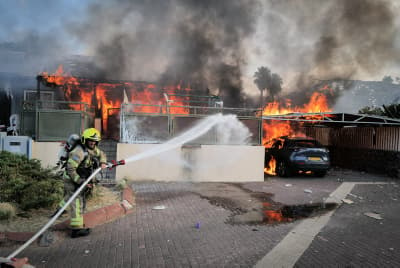Katzrin, Hezbollah, Ben Gvir
Ben Gvir: "We don't talk to Hezbollah– we aim and shoot"
Today's missile strike on Katzrin prompted National Security Minister Ben Gvir to call for robust military action against Hezbollah. The attack was part of a larger barrage of approximately 50 rockets and suicide drones launched by Hezbollah.

A missile strike hit Katzrin in the southern Golan Heights today, prompting a visit from National Security Minister Itamar Ben Gvir. The incident has heightened tensions along Israel's northern border and led to calls for increased military action against Hezbollah.
Ben Gvir, accompanied by Minister of the Negev, Galilee and National Resilience Yitzhak Wasserlauf, visited the impact site in Katzrin. After surveying the damage and speaking with local council head Yehuda Douah, Ben Gvir made a series of strong statements.
"The law of Katzrin is the law of Tel Aviv," Ben Gvir declared, emphasizing the need for a robust response. "We need to attack, we need to launch a campaign. This is the opportunity, we must not miss it." He further stated, "We don't talk with Hezbollah, with Hezbollah we aim our sights, shoot, hit, and fight."
The missile strike on Katzrin was part of a larger attack. Earlier in the day, Hezbollah launched approximately 50 rockets and suicide drones towards the southern Golan Heights and Upper Galilee areas. Air raid sirens were activated in several towns including Katzrin, Kidmat Tzvi, Avivim, Bar'am, Yir'on, Dalton, Gush Halav, Kerem Ben Zimra, Alma, and Rihaniya.
In response to these attacks and guided by intelligence from the Shin Bet and Military Intelligence, the Israeli Air Force conducted a strike in the Sidon area of southern Lebanon. The operation resulted in the elimination of Khalil Hussein Khalil al-Muqdad, identified as a Hezbollah operative.
The IDF provided additional context, stating that Khalil's brother, Munir al-Muqdad, is also involved in Hezbollah and Iranian Revolutionary Guard activities. Both are reportedly implicated in directing attacks and transferring funds and weapons to terrorist cells in Judea and Samaria.
As tensions continue to escalate, residents in northern Israel remain on alert. The situation underscores the ongoing security challenges faced by communities near the Lebanese border.
The Israeli government now faces decisions about how to respond to these provocations. Ben Gvir's call for a broader campaign against Hezbollah represents one perspective in what is likely to be a complex policy discussion in the coming days.
* Arutz Sheva contributed to this article.